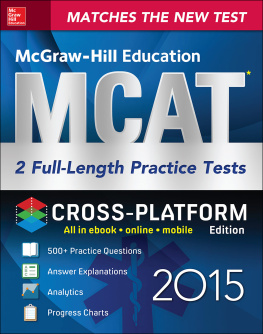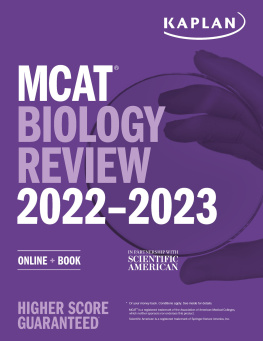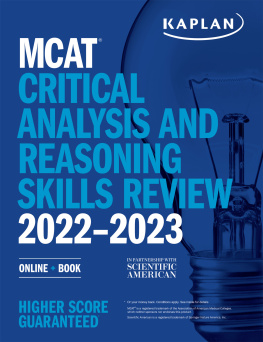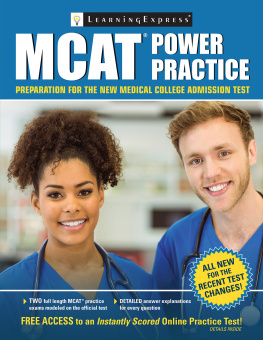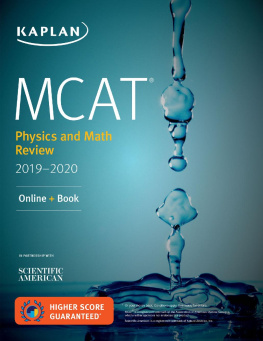About the Authors
George J. Hademenos, PhD, is a former Visiting Assistant Professor of Physics at the University of Dallas. He received his BS from Angelo State University, received his MS and PhD from the University of Texas at Dallas, and completed postdoctoral fellowships in nuclear medicine at the University of Massachusetts Medical Center and in radiological sciences/biomedical physics at UCLA Medical Center. His research interests have involved potential applications of physics to the biological and medical sciences, particularly with cerebrovascular diseases and stroke. He has published his work in journals such as American Scientist, Physics Today, Neurosurgery, and Stroke. In addition, he has written several books including The Physics of Cerebrovascular Diseases: Biophysical Mechanisms of Development, Diagnosis and Therapy, and Schaums Outline of Biology. He currently teaches general and advanced physics courses.
Candice McCloskey Campbell, PhD, received her doctorate in organic chemistry from Georgia Tech in 1985. She has been teaching at the undergraduate level since 1987. She currently teaches at Georgia Perimeter College in Dunwoody, Georgia. Her professional work has been in synthetic organic chemistry and mechanistic organic chemistry. She has been active with the Two-Year College Chemistry Consortium to enhance the chemistry curriculum at the two-year college level.
Shaun Murphree, PhD, is Professor and Chair of Chemistry at Allegheny College in Meadville, Pennsylvania. He received a BA in chemistry from Colgate University (Hamilton, New York) and a PhD in organic chemistry from Emory University (Atlanta, Georgia), and he conducted post-doctoral study at Wesleyan University (Middletown, Connecticut). His current research interests include microwave-assisted organic synthesis (MAOS), synthetic methodology, and heterocyclic synthesis. In addition to the present work, he has coauthored a monograph on microwave chemistry, several chapters and reviews on heterocyclic synthesis, and numerous articles in both the synthetic chemistry and chemistry education literature.
Amy B. Wachholtz, PhD, MDiv, MS, is an Assistant Professor of Psychiatry at the University of Massachusetts Medical School and the Director of Health Psychology at UMass Memorial Medical Center. Dr. Wachholtz graduated with a Master of Divinity degree from Boston University, where she specialized in bioethics. She then continued her education to earn a Masters and PhD in clinical psychology from Bowling Green State University, where she had a dual specialization in behavioral medicine and psychology of religion. She completed internship through fellowship at Duke University Medical Center, where she focused on medical psychology. She has also completed a post-doctoral MS degree in psychopharmacology. Dr. Wachholtz has multiple funded research projects with her primary focus on (1) bio-psycho-social-spiritual model of chronic pain disorders and (2) the complexities of treating of comorbid pain and opioid addiction in both acute pain and chronic pain situations. She enjoys teaching students from a variety of health disciplines, both in the classroom and on the clinical floors of UMass Memorial Medical Center Hospitals.
Jennifer M. Warner, PhD, is the Director of the University Honors Program and a member of the faculty in the Department of Biological Sciences at the University of North Carolina at Charlotte. She received her BS in Biology from the University of North Carolina at Chapel Hill, her MS in Biology with a focus in microbiology from the University of North Carolina at Charlotte, and her PhD in Curriculum and Teaching from the University of North Carolina at Greensboro. Her current research interests revolve around variables that influence student success and retention in the sciences. She currently teaches a variety of courses including principles of biology, human biology, the nature of science, and pathogenic bacteriology.
Kathy A. Zahler, MS, is a widely published author and textbook writer. She has authored or coauthored numerous McGraw-Hill Education preparation guides for tests, including the GRE, the Miller Analogies Test, the Test of Essential Academic Skills (TEAS), and the Test Assessing Secondary Completion (TASC).
About the Practice Tests
T he Practice Tests in this volume are designed to help you determine your readiness to take the actual MCAT. Each test has four separately timed sections as shown in the chart.
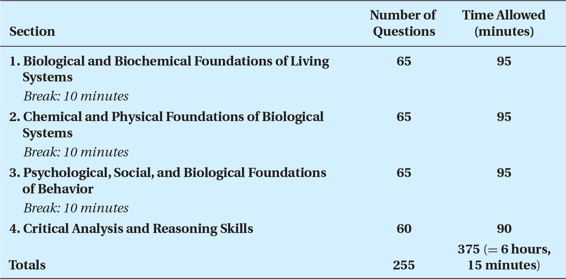
The questions are designed to match the real exam as closely as possible in format and degree of difficulty. If you approach these tests as you would the real exam, your results will give you a good idea of how well you would score if you took the real MCAT today.
Each test is followed by complete explanations for every question. Study the explanations carefully, particularly for questions that you missed or that you found difficult.
Following each set of explanations is an Evaluation Chart. Use it to measure your test-taking readiness and to pinpoint content areas that you may need to review again before taking the real exam.
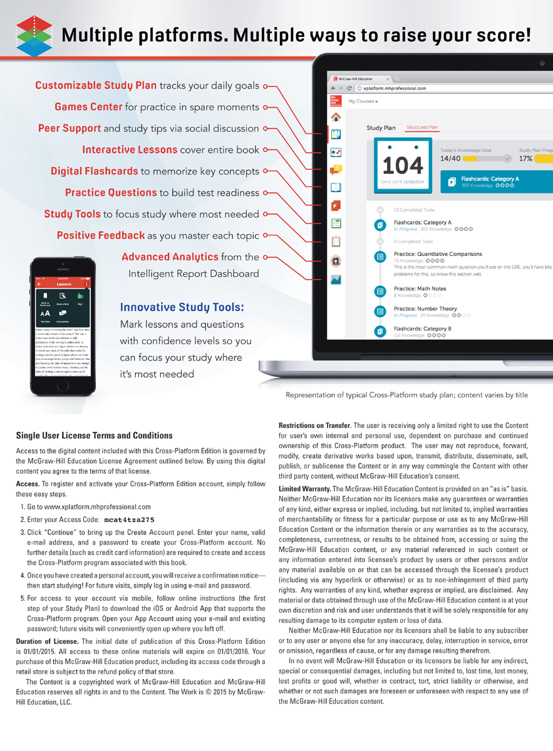
Contents
Copyright 2015 by McGraw-Hill Education. All rights reserved. Except as permitted under the United States Copyright Act of 1976, no part of this publication may be reproduced or distributed in any form or by any means, or stored in a database or retrieval system, without the prior written permission of the publisher.
ISBN: 978-0-07-182569-6
MHID: 0-07-182569-X
The material in this eBook also appears in the print version of this title: ISBN: 978-0-07-182441-5, MHID: 0-07-182441-3.
eBook conversion by codeMantra
Version 1.0
All trademarks are trademarks of their respective owners. Rather than put a trademark symbol after every occurrence of a trademarked name, we use names in an editorial fashion only, and to the benefit of the trademark owner, with no intention of infringement of the trademark. Where such designations appear in this book, they have been printed with initial caps.
McGraw-Hill Education eBooks are available at special quantity discounts to use as premiums and sales promotions or for use in corporate training programs. To contact a representative, please visit the Contact Us page at www.mhprofessional.com.
MCAT is a registered trademark of the Association of American Medical Colleges, which was not involved in the production of, and does not endorse, this product.
Amy B. Wachholtz, PhD, would like to thank Christopher Ayala, MA, for assistance with fact checking and editing the behavioral and social sciences material in this volume.
TERMS OF USE
This is a copyrighted work and McGraw-Hill Education and its licensors reserve all rights in and to the work. Use of this work is subject to these terms. Except as permitted under the Copyright Act of 1976 and the right to store and retrieve one copy of the work, you may not decompile, disassemble, reverse engineer, reproduce, modify, create derivative works based upon, transmit, distribute, disseminate, sell, publish or sublicense the work or any part of it without McGraw-Hill Educations prior consent. You may use the work for your own noncommercial and personal use; any other use of the work is strictly prohibited. Your right to use the work may be terminated if you fail to comply with these terms.

